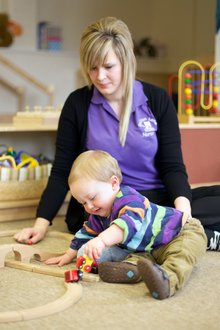Finding the time to read to your child can sometimes seem impossible in modern family life. If you’ve ever reached for the iPad or turned on the TV just to calm things down, you’re not alone. Research suggests, however, that choosing to make time to read to your children instead can really pay off.
Listening to stories helps children develop early language skills, boosts their imaginations and also introduces them to new ways of understanding the world they’re growing up in. There really is more to the humble bedtime story than meets the eye! Here are our five top reasons for why reading to your child is so important.
1. It will help them learn to read and write
It might not be immediately obvious why listening to you read a story aloud can help your child learn to read later on. But hearing stories will expose your children to language they might not hear in your home, boosting their vocabulary and familiarising them with words that they will come across themselves when they start to read independently. It will also introduce your child to the kind of sentence structure we use when we write, which can be quite different to the rhythms of everyday conversation. As your child grows older and begins to look at the words in the books, they will learn the shapes of letters, how letters come together to form words, and how those words form sentences, paragraphs, chapters and stories.
Try: Monkey Puzzle by Julia Donaldson – packed with fantastic rhythmic, rhyming language.
2. It stimulates the brain
Listening to a story and looking at the pictures in a book will stimulate almost every part of your child’s brain. The pictures they see, combined with words that describe a sensory experience, such as listening to rainfall, or smelling a freshly baked chocolate cake, makes sensors in the brain burst into life.
Try: All Afloat on Noah’s Boat by Tony Mitton – bright, colourful pictures and action-packed language.
3. It fosters a love of books
Learning to read and write will be much easier for your child if you have taught them to enjoy it. Children who love books find reading – and the lessons that they can learn from reading – a pleasure, not a chore. If sharing a book is a happy, enjoyable part of your everyday routine, your child will learn to see books, and the world of knowledge contained within them, as a source of joy.
Try: I Like Books by Anthony Browne – a book about how great books can be!
4. It’s accidental education
We all know that not all of life’s lessons get taught in a classroom. Just think of all the ‘accidental lessons’ that you can teach your child before they start school, just by reading them books about kings and queens, dinosaurs and explorers, the weather and the planets.
Try: Elmer’s Weather by David McKee – join Elmer as he experiences sun, rain, wind and snow.
5. It helps children (and adults!) wind down
The time between dinner and bed can be challenging in many homes. Faced with tired but somehow still giggly, bouncy children, it can be tempting to think that a bit of time sat in front of the TV might be just the thing to calm things down. But research shows that exposure to the light created by computers, phones and tablets can interfere with the brain’s ability to switch off and prepare for sleep. Reading a story, on the other hand, is distracting without being overstimulating, and helps busy little minds switch off from the day. Making a book part of your child’s regular bedtime routine will mean that they come to recognise it as a signal to prepare for sleep and it might just end your pre-bedtime struggles for good!
Try: Sweet Dreams, Maisy by Lucy Cousins – traces the journey from a busy day to a peaceful bedtime.
Written for the Early Years Alliance Alliance by Siobhan Godwood.







